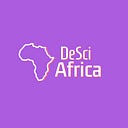Decentralized Science: The Future of Drug Discovery — Part One
Introduction
Over time, we’ve given you content that spans across different fields. However, in this series, we’ll be focusing on the health field so if you’re a health researcher, then don’t miss this series one bit.
As a health researcher, have you thought of the possibilities of decentralized science in the development of a drug either as a modification of an existing one or an entirely new one? In today’s article, we’ll be discussing the need for decentralized drug discovery and how decentralized science can improve the process of drug discovery. Now, let’s get right into it!
Need for Decentralized Drug Discovery
Before we dive into the need for decentralized drug discovery, let’s understand its meaning. Decentralized drug discovery is the process of discovering new drugs through a decentralized and collaborative framework. It involves the participation of diverse stakeholders, including researchers, data scientists, patients, and citizen scientists, who work together to accelerate the discovery and development of novel therapeutics.
Accelerate drug discovery
Traditional drug discovery is a time-consuming and costly process, often taking many years and billions of dollars to bring a new drug to market. Decentralized drug discovery aims to speed up this process by promoting collaboration, data sharing, and the integration of diverse expertise. By leveraging collective intelligence and resources, decentralized drug discovery can potentially identify promising drug candidates more rapidly.
Easy access to diverse data
Drug discovery requires access to a wide range of data, including genomic data, clinical data, and drug screening results. Traditional drug development models usually face challenges in accessing and integrating diverse datasets due to proprietary restrictions and data silos. Decentralized drug discovery encourages open data sharing and collaboration, enabling access to a broader range of data sources, which can lead to new insights and discoveries.
Aids transparency and reproducibility
The lack of transparency and reproducibility of research findings has been a problem in the scientific community. Decentralized drug discovery promotes open science practices, transparent data sharing, and robust validation processes. This increases the rigour and reliability of research outputs and enhances the reproducibility of findings, ultimately improving the quality and credibility of drug discovery efforts.
Increase innovation and novelty
The pharmaceutical industry faces the challenge of diminishing returns in terms of new drug discoveries. Decentralized drug discovery fosters open innovation by enabling researchers from different disciplines, organizations, and even non-traditional backgrounds to collaborate and contribute their unique perspectives and approaches. This can stimulate novel ideas, unconventional research directions, and innovative drug discovery strategies.
Although there are several needs for decentralized drug discovery, these are just a few reasons why decentralized drug discovery is needed, especially in Africa. We’ll move quickly into how decentralized science can improve the process of drug discovery to ensure these reasons listed above are met.
How DeSci Can Improve the Process of Drug Discovery
Enhanced Collaboration
Decentralized science encourages contributions from different people by encouraging collaboration among researchers, institutions, and experts from various disciplines, enabling the sharing of knowledge, expertise, and resources. This collective effort allows for the cross-pollination of ideas, leading to more innovative approaches and increased chances of finding breakthrough drug candidates.
Enabled Open Data Sharing
Decentralized drug discovery promotes the upload and sharing of any kind of data, whether preclinical or clinical. Open data initiatives facilitate the integration of diverse datasets, allowing researchers to analyze larger and more comprehensive data sets, identify patterns, and make more informed decisions in the drug discovery process. Researchers can also build their research on existing data instead of starting all over again.
Computational Modeling and Artificial Intelligence
One important concept in drug discovery is understanding the interaction between drugs and their targets. Decentralized drug discovery leverages computational modeling and artificial intelligence (AI) algorithms to analyze complex datasets, identify patterns, and predict drug-target interactions. AI-driven approaches can help prioritize potential drug candidates, optimize molecular structures, and predict toxicity profiles, saving time and resources during the early stages of drug discovery.
Increased Participation of Diverse Expertise
Decentralized science breaks the barriers of systems, including the drug discovery system, by bringing together experts from different fields such as biology, chemistry, data science, and computational modeling. This multidisciplinary collaboration enables a holistic approach to drug discovery by combining knowledge and techniques from various domains to tackle complex scientific challenges more effectively.
Ensure data security and privacy
Blockchain technology can be utilized in decentralized drug discovery to ensure data security, privacy, and integrity. By leveraging blockchain’s distributed ledger system, researchers can securely share data, track contributions, and maintain an immutable record of scientific discoveries, enhancing transparency and trust within the research community.
Great! We’re glad you read through to the end of this article, and we are proud of you. We are sure you learned something new today, so do tell us in the comments. Meanwhile, in our next article, we’ll be revealing the challenges of decentralized science in drug discovery and the various platforms you can utilize to connect to the vision of decentralized drug discovery. So don’t worry, we got you!
Until then, stay tuned!
